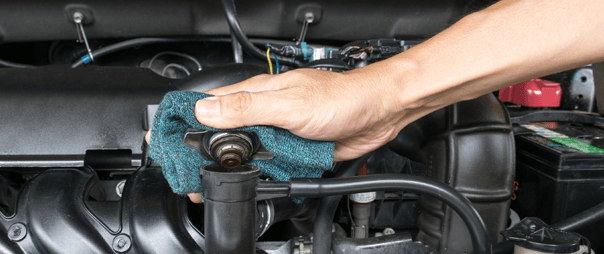
When you drive, the parts within your engine are creating some serious friction and that friction generates heat. Without a fully operational radiator & engine cooling system, things can quickly get heated!

In simple terms, the cooling system is what keeps your car from overheating. When you’re putting stress on your engine, the system circulates water and coolant through your engine to keep its components cool. The cooling system maintains your engine at a constant temperature. It consists primarily of the engine coolant temperature sensor (ECT), heater core, fan, radiator, thermostat, and water pump. If any of these parts malfunction, your engine runs the risk of overheating and even melting components.
Radiator problems in a car are very common, usually resulting from rust and corrosive mineral deposits that build up over time. When this happens, coolant becomes constricted and can’t circulate normally. Like all vehicle parts, your radiator is not immune to corrosion caused by age. We also see radiators fail because related cooling system parts malfunction or get damaged, like the thermostat and water pump, or parts such as fan belts and hoses become loose, leak and crack.
The gauge on your dashboard will indicate when your car is running hot or if there is a problem with your cooling system. It is also possible that you’ll see a warning light. It is important that you do NOT ignore these signs! If your car is overheating, or runs slightly hotter then before, your radiator may be malfunctioning or damaged.
At Stewart’s Donnybrook Automotive in Tyler, TX, our AC Delco certified mechanics know how-to quickly diagnose, repair or replace any engine cooling system part to ensure your engine is cooling at the right temperature.
We begin diagnosing your car’s system by looking into the radiator for sufficient antifreeze/coolant level. If coolant leaks or a low fluid level is not detected, we then investigate “when” the overheating occurs. For example, does your car overheat while stopped or at idle, while driving on the highway, or both? In each scenario we’re looking for reasons for poor air flow and coolant circulation.
While we always try our best to perform a quick repair, sometimes the radiator damage is too great and it is necessary to replace a unit. The cost to replace a radiator varies depending on the model and year of your vehicle. A radiator replacement can be avoided if you follow preventative auto maintenance, like a scheduled coolant flush.
Most vehicle manufacturers recommend replacing coolant antifreeze at regular intervals. The chemicals in antifreeze are formulated to perform a multitude of tasks including corrosion control, heat absorption, and the proper operation of your vehicle’s interior heating system. The certified professionals at Stewart’s Donnybrook recommended that you have the system serviced at least once a year. Furthermore, we offer more than just a “drain-and-fill”. We will fully evaluate the health of your radiator and can provide complete cooling system repair if warranted.
Proper maintenance and care of the radiator and the antifreeze system in your automobile is vital to the life of the engine, not to mention can save you hundreds of dollars in unnecessary repairs later. Stop by Stewarts Automotive or give us a call today. We have all your Tyler TX automotive repair and maintenance needs covered.